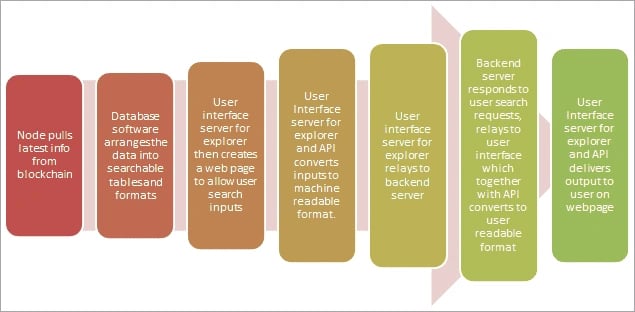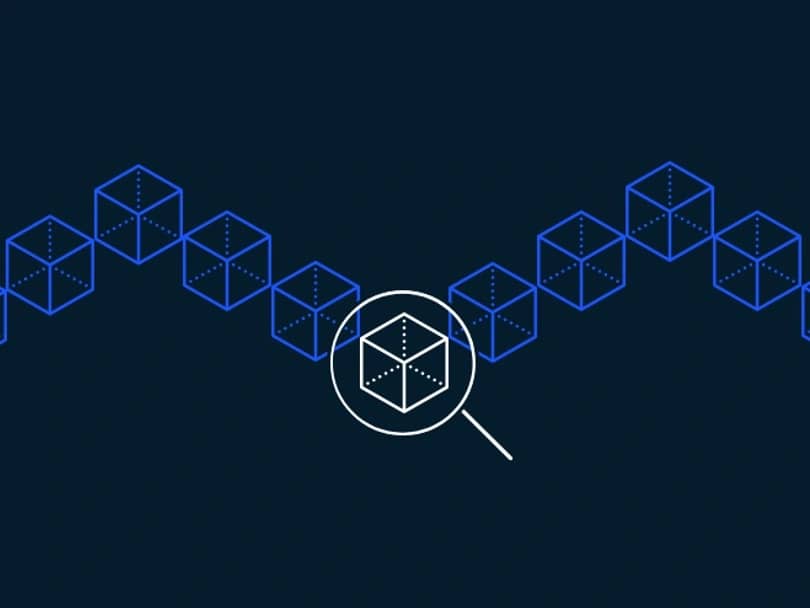Subscribe to wiki
Share wiki
Bookmark
Block Explorer
The Agent Tokenization Platform (ATP):Build autonomous agents with the Agent Development Kit (ADK)
0%
Block Explorer
Block Explorer is a search engine for all data recorded on a distributed ledger. It is a tool used to view all the information associated with blocks, addresses, and past and current transactions on a blockchain [6], and provides detailed analytics about a blockchain network since its genesis.[1]
Overview
Block explorers are usually tied to a particular blockchain network. As each blockchain uses a different coding infrastructure, this can affect the functionality of any given explorer. For instance, a Bitcoin block explorer only tracks data from BTC transactions, while most Ethereum explorers provide network information on the thousands of Ethereum-minted tokens, such as ETH, UNI, USDT, and SHIBA. [2] The information that a block explorer contains may also vary depending on the architecture of the blockchain it serves. For instance, a block explorer for a Proof-of-Work (PoW) blockchain displays data about miners, whereas a block explorer for a Delegated Proof-of-Stake (DPoS) blockchain displays information about block producers and elections.[7]
The first blockchain explorer, which was meant for the Bitcoin blockchain, emerged in November 2010 at almost the same time as Bitcoin was coming online. It was made available first at theymos.ath.cx:64150/bbe. The first explorer for Bitcoin was the Bitcoin equivalent of TorStatustorstatus.blutmagie.de. The explorer provided data about Bitcoin and afterward, was moved to blockexplorer.com where the real stats page for the blockchain was posted.[9]
Functions
View a transaction
Block explorers are commonly used to view transaction history. Every cryptocurrency transfer from one wallet to another will be recorded on a compatible block explorer. This can be particularly useful for pending transactions and unconfirmed transactions, as investors can search the status of all the transactions made and ensure no crypto has gone missing.
View a block
Most cryptocurrencies gets activated through individual blocks of data being validated and stored. Investors can view the recently mined blocks on a Block Explorer. For instance, researchers can trace a blockchain’s history back to its genesis block, i.e., the first group of transactions confirmed on a network.
View fees
Making transactions on a blockchain network incurs a fee. For instance, Ethereum and Bitcoin have hefty costs associated with using their blockchain. These gas fees constantly fluctuate, so investors can view the live rates for Gwei (Gigawei, aka, nanoEther, aka, nano) and Bitcoin fees on a block explorer.
[4]
Address Search
Block explorers enable users to search for specific wallet addresses. They can view the balance, transaction history, and other details associated with a particular address.
Token and Asset Information
Block explorers often support the tracking of various tokens and assets issued on the blockchain. Users can view details about these tokens, including supply, holders, and transfers.
Smart Contract Interaction
For blockchains that support smart contracts, users can explore smart contract addresses, view contract code, and inspect interactions with the contract, including function calls and events.
Real-time Statistics
Block explorers provide real-time statistics about the blockchain network, including the current block height, network hashrate, transaction count, and more. This information is useful for monitoring network health and performance.
Address Labels and Tags
Some block explorers allow users to add labels or tags to addresses, making it easier to identify specific addresses and their purposes.
Rich List
Block explorers often provide a list of the top wallet addresses by balance. This can help users identify the largest holders of a particular cryptocurrency.
Network Insights
Block explorers offers additional insights and analytics, such as transaction fee trends, mempool data, and historical data charts, to help users understand network behavior.
API Access
Many block explorers offer APIs (Application Programming Interfaces) that developers can use to programmatically retrieve blockchain data for their applications.
Explorer for Multiple Blockchains
Some block explorers support multiple blockchain networks, allowing users to explore and compare different blockchains in one interface.
[8]
A block explorer not only provides blockchain transaction data but can also show the blockchain’s overall health. All the block explorers might not have the same functions, but, few explorers also show data about mining pools, block validators, orphan blocks, and hard forks. [8]
Tech
A blockchain explorer is a piece of software that uses API and blockchain nodes to draw various data from a blockchain and then uses a database to arrange the searched data and to present the data to the user in a searchable format.

First, the explorer uses its API
- (Application Programming Interface), SQL (Structured Query Language), and a relational database to scrape a blockchain node and receive information. Once the data is organized, it is presented in a simple-to-navigate user interface hosted on a web server. The relational database and SQL analyze searches on the block explorer’s back-end. Finally, the results are sent through an API to ensure users can consume the HTML webpage on a browser like Google Chrome. [5]
Common Block Explorers
Since the development of the first blockchain explorer tool, Blockexplorer.com was run by BitcoinTalk Forum's pseudonymous owner, Theymos. It was launched in early 2010 and allowed users to navigate the Bitcoin blockchain, view block and transaction data, and much more. Since then, more explorers have been developed.
- Blockchain.com (Blockchain.org): It allows the search of Bitcoin blockchains by blocks, transactions, and addresses.
- Blockchair: It allows the search of information on Bitcoin, Ethereum, and Bitcoin Cash blockchains including searching of words, phrases, nodes, Mempool size, and mining difficulty. Blockchair blockchain explorer allows searching transactions in other blockchains, including Ripple, Litecoin, Cardano, Bitcoin SV, Stellar, Monero, Dash, Zcash, Dogecoin, Mixin, Groestlcoin, Telegram Open Network.
- Tokenview: this is the Chinese-based explorer launched in 2018 and allows the search of data on multiple blockchains.
- Etherscan: It is the most used Ethereum blockchain explorer. It allows the search of transactions, addresses, smart contracts, wallet balances, etc.[10]
See something wrong?
The Agent Tokenization Platform (ATP):Build autonomous agents with the Agent Development Kit (ADK)

